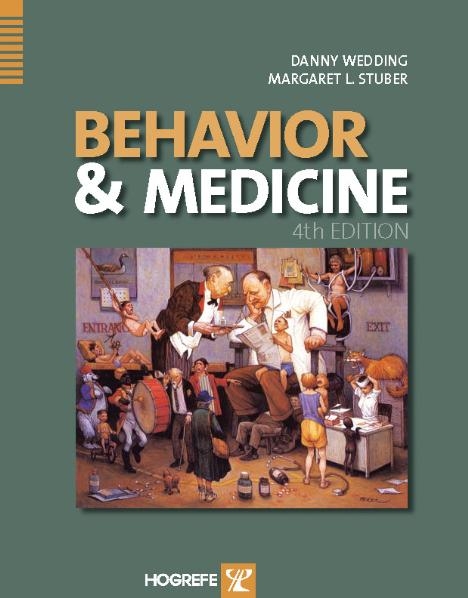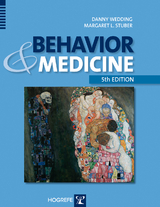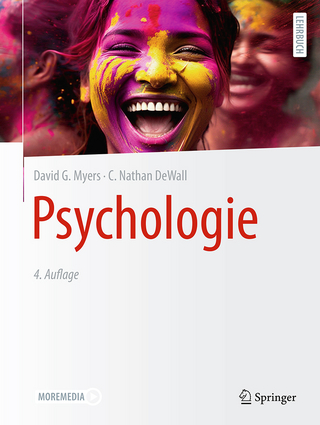
Behavior and Medicine
Hogrefe & Huber (Verlag)
978-0-88937-305-1 (ISBN)
- Titel erscheint in neuer Auflage
- Artikel merken
This new edition of one of the most popular and highly regarded texts on behavioral science and psychology has been fully updated and restructured to reflect the latest Institute of Medicine's recommendations on the teaching of behavioral sciences in medicine. Its 26 chapters are divided into six core domains: mind-body interactions in health and disease; patient behavior; the physician's role and behavior; physician-patient interactions; social and cultural issues in health care; and health policy and economics. Danny Wedding, PhD, Professor of Psychiatry at the University of Missouri - Columbia, is joined as editor by Margaret Stuber, MD, Professor of Psychiatry at UCLA for this edition. Under their careful guidance and editing, around 40 leading educators from major medical faculties have contributed to produce the most comprehensible and didactically well-designed text in its field. Unique to "Behavior and Medicine", for instance, is the use of hundreds of works of art, poetry, and aphorisms to provoke thought and interest and to illuminate the most important points.
It's main features are: practical, clinical emphasis, based around the core topics recommended by the Institute of Medicine; comprehensive, trustworthy, and up-to-date; competitive price compared to other much less comprehensive, question-and-answer-type, course review works; written and carefully edited by leading educators at major medical faculties; numerous case examples, tables, charts, and boxes for quick access to information; learning and exam aids, such as sample USMLE review questions; and new chapters on: physician well-being; working with other professionals, organizations, and communities; facilitating health behavior change; communicating with patients; management of difficult patients; culturally competent healthcare; impact of social inequalities; and economics and health. This is a unique textbook, comprehensive and up-to-date, with a practical, clinical emphasis and a structure that is ideally suited to teaching behavioral sciences in the medical school classroom.
Forewords; Preface; Acknowledgments; Poetry Credits; Contributors; Part 1: Mind-Body Interactions in Health and Disease; Mind, Brain, and Behavior by Daniel J. Siegel, Alex W. Siegel, & Jack B. Amiel; Families, Relationships, and Health by Margaret L. Stuber; Birth, Childhood, and Adolescence by Harsh K. Trivedi & Pamela J. Beasley; Early Adulthood and the Middle Years by Joseph D. LaBarbera, Sharon Turnbull, & Barry Nurcombe; Old Age by Randall Espinoza & Randy Mervis; Death, Dying, and Grief by John E. Ruark; Chronic Benign Pain by Laurence A. Bradley; Part 2: Patient Behavior; Stress and Illness by John E. Carr; Addictions by Thomas F. Newton; Psychodynamic Approaches to Human Behavior by Peter B. Zeldow; Facilitating Health Behavior Change by Adam Arechiga; Human Sexuality by Jeannine Rahimian, Jonathan Bergman, George R. Brown, & Salvador Ceniceros; Part 3: The Physician's Role; Medical Student and Physician Well-Being by Margaret L. Stuber; Working with Other Professionals, Organizations, and Communities by Iris Cohen Fineberg; Part 4: Physisian-Patient Interactions; The Physician-Patient Relationship by Howard Brody; Communicating with Patients by Peter Zeldow & G. Makoul; Diagnostic Reasoning in Medicine by Barry Nurcombe; Patient Assessment by John C. Linton & Steve Coay; Recognizing and Treating Psychopathology in Primary Care by Debra Bendell Estroff & Pilar Bernal; Managing Difficult Patients by Brenda Bursch; Humanities and the Practice of Medicine by Steven C. Schlozman; Part 5: Social and Cultural Issues in Health Care; Culturally Competent Health Care by David M. Snyder & Peter Kunstadter; Complementary and Alternative Medicine by Marc E. Brodsky & Ka-Kit Hui; The Impact of Social Inequalities on Health Care by Russell F. Lim, F. G. Lu, & Donald M. Hilty; Part 6: Health Policy and Economics; Health Services in the United States by E. Andrew Balas; American Medicine in Sick by David T. Feinberg; Appendices; A. Behavioral and Social Science Topics of High and Medium Priority for Inclusion in Medical School Curricula from the Institute of Medicine Report on Improving Medical Education: Enhancing the Behavioral and Social Science Content of Medical School Curricula; B. Medical Statistics & Research Design by Fredric M. Wolf; C. Abriged Directory of Humanities Resources for Medical Education and Practice by Steven C. Schlozman, Carol C. Donley & Martin Kohn; D. USMLE Practice Questions; E. Answer Key to USMLE Practice Questions; Subject Index.
| Erscheint lt. Verlag | 1.5.2006 |
|---|---|
| Zusatzinfo | 41 tables, 89 figures |
| Verlagsort | Toronto |
| Sprache | englisch |
| Maße | 216 x 280 mm |
| Einbandart | Paperback |
| Themenwelt | Geisteswissenschaften ► Psychologie ► Klinische Psychologie |
| Geisteswissenschaften ► Psychologie ► Sozialpsychologie | |
| Geisteswissenschaften ► Psychologie ► Verhaltenstherapie | |
| Medizin / Pharmazie ► Medizinische Fachgebiete | |
| ISBN-10 | 0-88937-305-1 / 0889373051 |
| ISBN-13 | 978-0-88937-305-1 / 9780889373051 |
| Zustand | Neuware |
| Haben Sie eine Frage zum Produkt? |
aus dem Bereich



